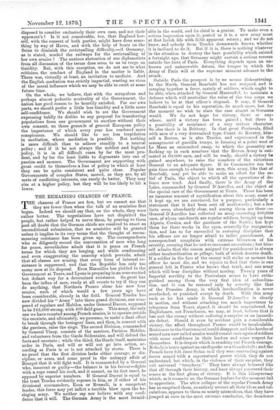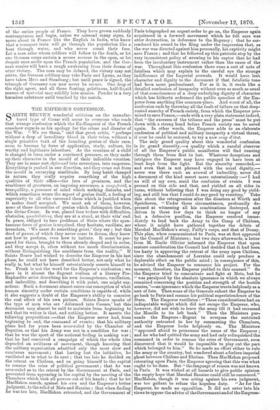THE REMAINING CHANCES OF FRANCE.
THE chances of France are few, but we cannot see that they are fewer than when the talk of an armistice first began. Indeed • we should say that, on the whole, they were
rather better. The negotiations have not dispirited the people, but rather helped to nerve them, by proving to them past all doubt that the German chiefs are resolved to exact an unconditional submission, that no armistice will be granted unless it implies in its very terms that the thought of recom- deuce that it will. The German Army is the most formid-
mencing resistance has been given up. The correspondents who so diligently record the conversation of men who long for peace, nevertheless admit that it is peace on French terms for which they are longing, and while condemning and even exaggerating the anarchy which prevails, admit that all classes are arming, that every form of internal re- sistance is suppressed, and that the Republic has only too many men at its disposal. Even Marseilles has yielded to the Government at Tours, and Lyons is preparing in an over-excited but defiant way for a determined resistance. So great has been the influx of men, ready at all events to try if they can do anything, that Northern France alone has now four armies, each of which would a few years ago have been considerable, already in the field. General Trochu has now divided his " Army " into three grand divisions, one com- posed of regulars and Mobiles, under General Ducrot, supposed to be 243,000 strong, with 400 field guns. This army, the only one we have counted among French armies, is to operate outside the enceinte, and ultimately, we presume, to make a final effort to break through the besiegers' lines, and then, in concert with the garrison, raise the siege. The second Division, commanded by General Vinoy, consists of the marines, Parisian Mobiles, and volunteers from the Garde Sedentaire, and will defend the forts and enceinte ; while the third, the Garde itself, maintains order in Paris, and will or will not go into action, ac- cording as Paris is or is not attacked by storm. There is no proof that the first division lacks either courage, or dis- cipline, or arms, and some proof in the unhappy affair of Bourget that it will fight well. It is commanded by a General who, innocent or guilty—the balance is in his favour—fights with a rope round his neck, and it cannot, on its first onset, be opposed by superior numbers. If General Ducrot is equal to the trust Trochu evidently reposes in him, or if either of his divisional commanders, Exea or Renault, is a competent leader, this force may yet inflict a terrible blow upon the be- sieging army. We neither say nor believe with any confi-
able in the world, and its chief is a genius. To make even a serious impression upon it, posted as it is, a new army must at first lavish life with little apparent return ; and we do not know, and nobody from Trochu downwards knows, whether it is inclined to do it. But if it is, there is nothing whatever in the situation to destroy the bare possibility which existed a fortnight ago, that Germany might sustain a serious reverse outside the forts of Paris. Everything depends upon an un- known and unknowable datum, the temper in which the Army of Paris will at the supreme moment advance to the attack.
Outside Paris the prospect is by no means disheartening. In the North, General Bourbaki has not resigned, and is scraping together a force, mainly of soldiers, which ought to be able, when attacked by General Manteuffel, to maintain a defence which will neutralize the value of the two corps we believe to be at that officer's disposal. It may, if General Bourbaki is equal to his reputation, do much more, but for the moment we wish to state the case almost as Germans
would. We do not hope for victory, there or any- where, until a victory has been gained ; but there is a possibility of resistance of a very serious character. So also there is in Brittany. In that great Peninsula, filled with men of a very determined type, Count de Keratry, him- self a Breton, as is also Trochu, and experienced in the management of guerilla troops, is forming at a point west of Le Mans an entrenched camp, to which the peasantry are flocking up in such numbers that the Breton Army is esti- mated at 60,000 men, and will be ready, should a victory be gained anywhere, to raise the numbers of the victorious General to an adequate figure. If its Commander can but gain time enough to educate his men, this army, like that of Bourbaki, may yet be able to make an effort for the re- lief of Paris, the object to which all the operations of de- fence now tend. And finally, there is the Army of the Loire, commanded by General D'Aurelles, and the object of the special care of the Government at Tours. There has been an immense amount of mystification about this army, some of it kept up, we are convinced, for a purpose, particularly a statement that it had been sent off northwards ; but a few facts seem abundantly clear, and among them are these :- General D'Aurelles has collected an army exceeding 100,000 men, of whom one-fourth are regular soldiers, brought up from Algeria, Corsica, and the garrisons of the South ; has kept them for three weeks in the open, avowedly for reorganiza- tion, and has so far succeeded in restoring discipline that his officers are no longer afraid to inflict punishment. A correspondent complains with extreme bitterness of his severity, averring that he orders incessant executions ; but him- self admits that the reason assigned for punishment is always either insubordination or pillage, both of which deserve death. If a soldier in the face of the enemy will strike or menace his officer be must die, and we rejoice to find that there is one general left in France who knows that truth, and one army which will bear discipline without mutiny. Twenty years of Imperial servility to the Prwtorians seems to have extin- guished among them the very first idea of subordina- tion, and it can be restored only by severity like that of the Prussian Army, in which insubordination is never overlooked, or punished except by death. With this army such as he has made it General D'Aurelles is clearly in motion, and without attaching too much importance to telegrams from Tours, signed, it should be remembered, by Englishmen, not Frenchmen, we may, at least, believe that it has met the enemy without suffering a surprise or an immedi- ate defeat. Should it even by accident gain a considerable victory, the effect throughout France would be incalculable. Resistance to the Governmentwould disappear, and the hordes of armed men now called armies would consist once again of soldiers with some confidence in their leaders and some respect for themselves. It is despair which is crushing out French courage. Nobody is brave against an earthquake or a thunderbolt; and the French have felt since Sedan as if they were contending against forces armed with a supernatural power which they do not understand, but which, in the violence of their surprise, they call universal "treachery." They have always behaved like that all through their history, and have always recovered their senses at the first gleam of victory. It is this idiosyncrasy which, as it seems to us, the German leaders for the moment fail to appreciate. The uttar collapse of the regular French Army has so surprised them, so entirely °versa all their ideas and cal- culations, appears to them so nearly miraculous, that they have
jumped at once to the most extreme conclusion, the decadence of the entire people of France. They have grown suddenly contemptuous, and begin, unless we misread many signs, to move about in France like the English in India, who know that a transport train will go through the population like a boat through water, and who never count their foes. Let a man arise whom soldiers will follow to the death, or let one German corps sustain a severe reverse in the open, or let despair once settle upon the French population, and the Ger- man armies will have a rough awakening from their dream of utter victory. The man may be delayed, the victory may not arrive, the German soldiery may take Paris and Lyons, as they have taken Metz and Strasburg ; but until peace is signed, the triumph of Germany can now never be secure. One drop of the right agent, and all these floating, gelatinous, half-liquid masses of material may solidify into armies. Powder is a very harmless substance until touched by the match.



































 Previous page
Previous page